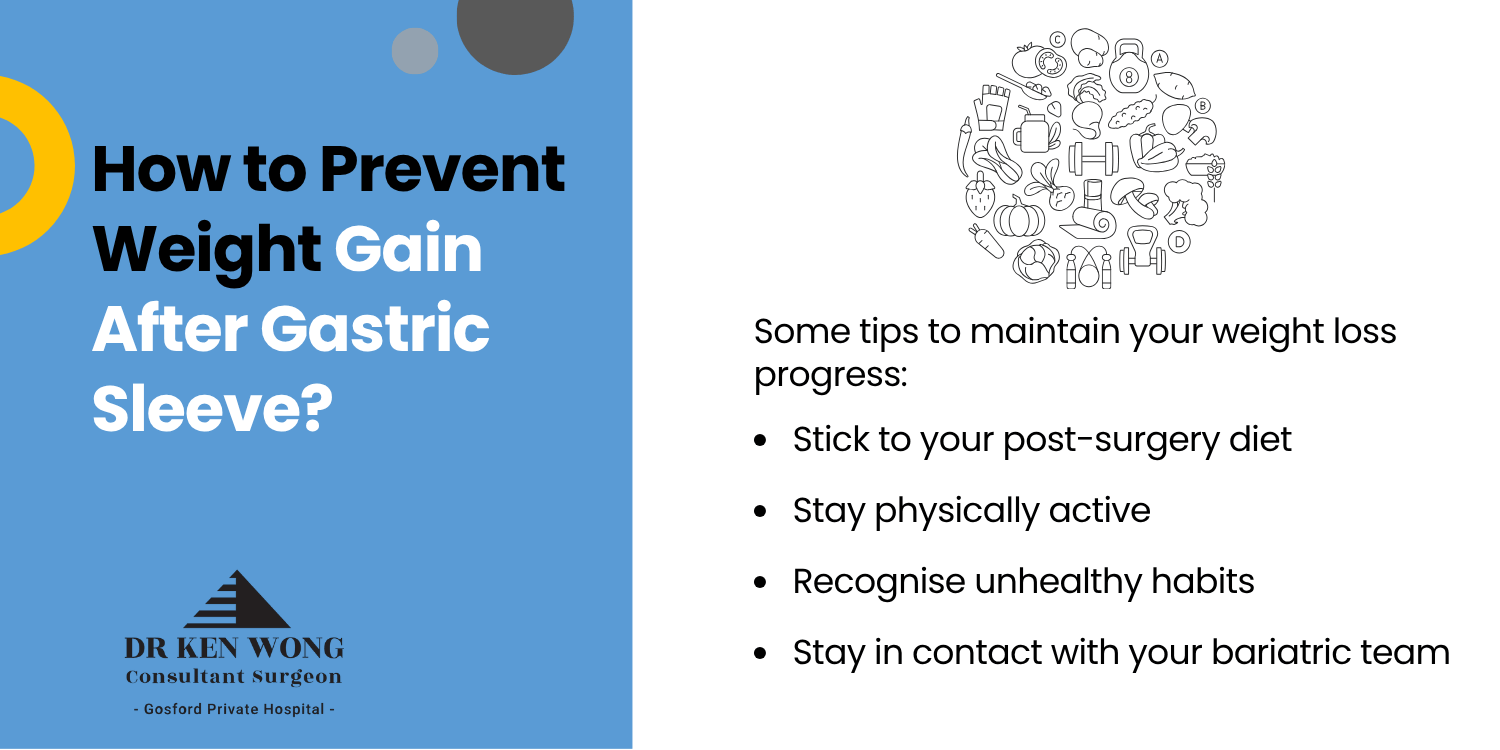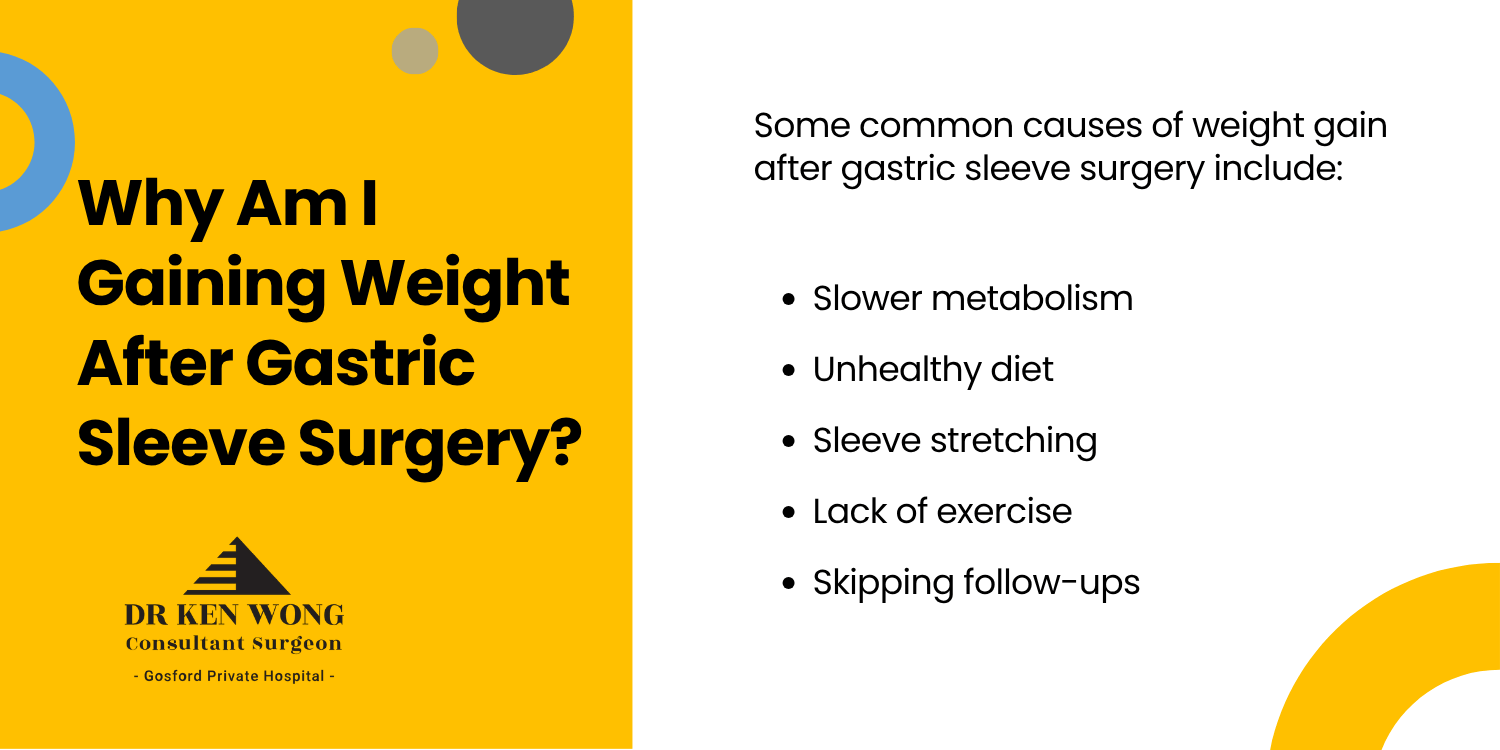
If you’re considering having gastric sleeve surgery, you may be concerned about the likelihood of you regaining weight after your recovery.
Weight gain after a gastric sleeve is possible, and while it can be disheartening, it does not mean you’ve failed or you’re back at square one. Each body adapts in different ways to a gastric sleeve and weight gain may mean you need to make some lifestyle adjustments to stay on track.
Let’s explore the likelihood of gaining weight after gastric sleeve surgery, why this happens, and how you can prevent it from ruining your progress.
Can You Gain Weight After Gastric Sleeve?
Following gastric sleeve surgery, the size of the stomach is reduced by about 80% and patients can see dramatic weight loss results quickly.
But without the necessary lifestyle adjustments and sticking to your post-surgery diet and exercise plan, patients can see start to gain weight after the initial weight loss. Even small diversions from your new plan - such as eating large portions or regularly snacking - can add up and make a big difference.
Some patients who have followed their plan after their surgery can still see some weight gain, particularly in the 2 to 5 years post-operation.
While you may be concerned as to why you’re putting on weight again, it is simply a reflection of how your body is adapting and can be helped with small lifestyle changes.
Why Am I Gaining Weight After Gastric Sleeve Surgery?
Common causes of weight gain after gastric sleeve surgery include:
Slower metabolism
After your surgery, your metabolism will decrease as your body adapts to maintaining its weight with fewer calories. This means that to keep losing weight, you need fewer calories.
Unhealthy diet
It’s so easy to slip back into unhealthy eating habits and even small diversions from your diet plan can add up over time. These habits include grazing, restricting then bingeing, forgetting portion control, eating a lot of processed foods, drinking sugary drinks, and alcohol.
Sleeve stretching
Your new sleeve can expand inside your stomach over time if you are eating bigger portions or grazing on snacks. This stops you feeling fuller quicker and makes it easier to consume more calories.
Lack of exercise
Physical activity is essential to burn calories and maintain muscle mass. Moving your body also helps to reduce stress levels and keep hunger at bay.
Skipping follow-ups
Attending check-ins with your bariatric team is important to keep you on track with your weight loss and hold you accountable for any diversions from your plan.
What’s the Point in a Gastric Sleeve if You Regain Weight?
While it can be discouraging to put weight back on after a gastric sleeve, a small amount of weight regain is normal and expected. Even with the small weight gain, a gastric sleeve provides life-changing, long-term benefits which transform a patient’s quality of life.
In the 10 years after their surgery, the average patient will lose and keep off half of their excess body fat. This leaves them with:
-
Enhanced self-esteem and more confidence
-
Better fitness levels
-
Improved mental health
-
Increased libido
-
Reduced risk of weight-related illness like type 2 diabetes, high blood pressure, high cholesterol, liver disease, and sleep apnea
Gastric sleeve surgery is not a one-off quick fix. It enables overweight individuals to kickstart their weight loss and get on the road to a healthier lifestyle.
With a commitment to following your new diet and exercise plan and maintaining a healthy lifestyle, gastric sleeve surgery can change your life.
How to Prevent Weight Gain After Gastric Sleeve?
These are the best ways to maintain your weight loss progress following gastric sleeve surgery:
1. Stick to your post-surgery diet
Your bariatrician will give you personalised diet advice throughout your recovery. This will include balanced meal plans from the nutritionist which prioritise protein-rich foods and limit processed foods. You will also adopt healthier eating habits like portion control, mindful eating, and not grazing throughout the day. It will be hard at first, but it’s also about a lifestyle change, rather than a strict ‘diet’.
2. Stay physically active
It could be as simple as walking and doing light strength workouts, but moving your body every day is important to keep up progress. A mixture of cardio to burn calories and strength training to build muscle will likely be recommended, but your specific exercise plan will be tailored to your needs, depending on where you’re at in your post-surgery journey.
3. Recognise unhealthy habits
Recognising the habits which are impacting your progress will make it easier to break them. Eating mindlessly, restricting then bingeing, and eating more than your body needs are some of the most common patterns.
4. Stay in contact with your bariatric team
Long-term weight loss success is only achieved with guidance and support. At Central Coast Surgery, we provide ongoing care throughout your recovery and partner with nutritionists and dietitians to provide personalised nutritional advice based on your body’s needs.


